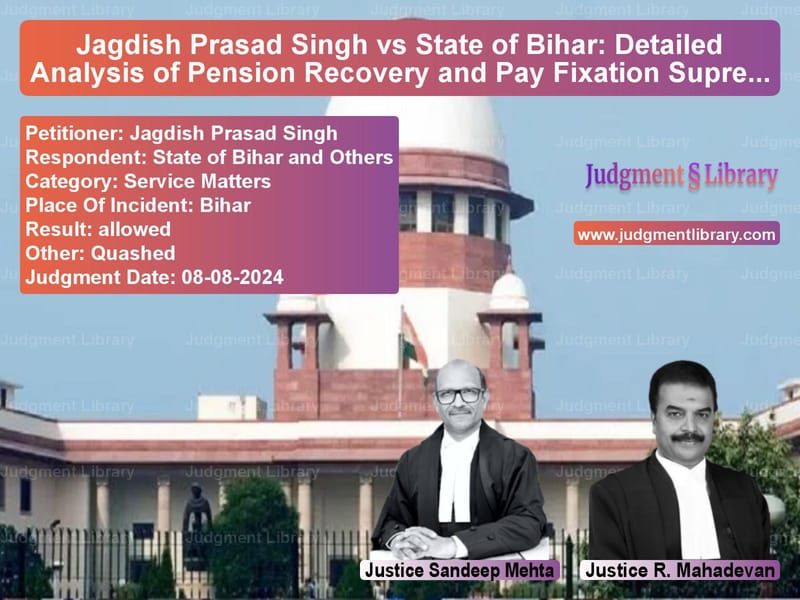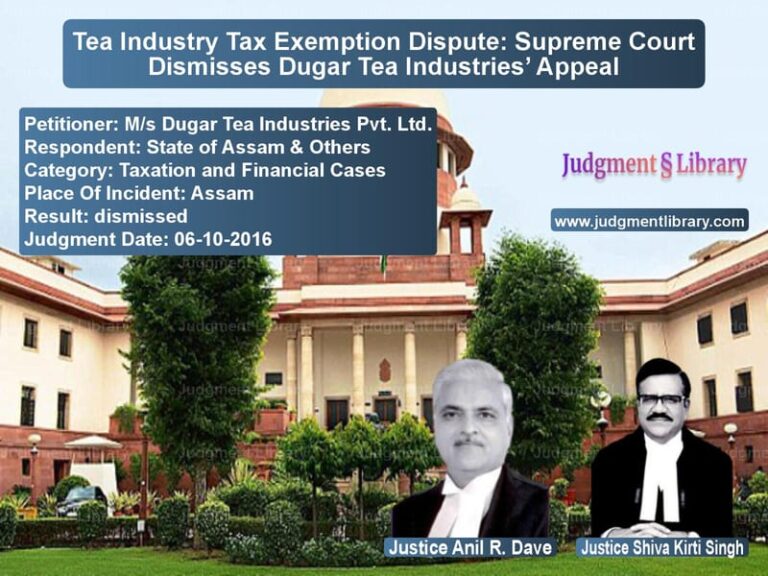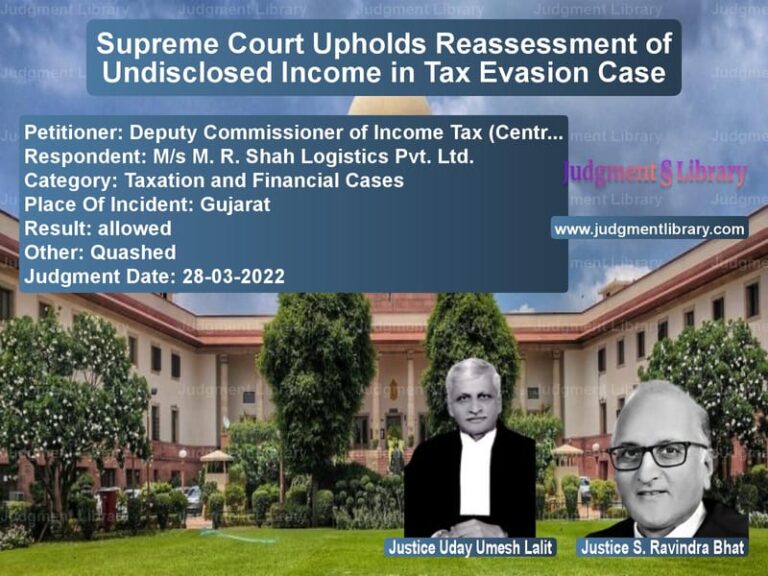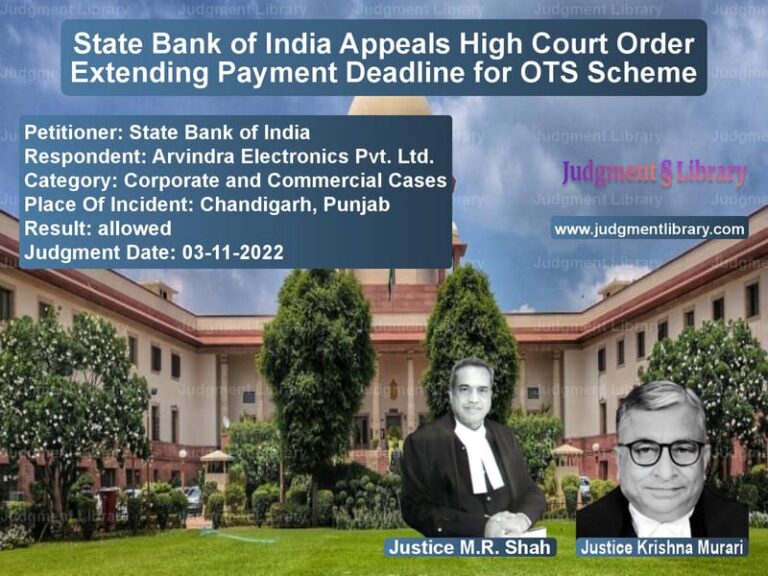Jagdish Prasad Singh vs State of Bihar: Detailed Analysis of Pension Recovery and Pay Fixation Supreme Court Judgment
Jagdish Prasad Singh’s case against the State of Bihar is a profound reflection of how complexities within administrative policies and subsequent judicial interventions shape the rights of retired government employees. This detailed blog elaborates the intricacies involved in the landmark judgment delivered by the apex court on 8th August 2024, scrutinizing pension recovery and pay scale fixation errors by administrative authorities.
Jagdish Prasad Singh commenced his journey as a dedicated public servant in the Government of Bihar, appointed as a Supply Inspector in the year 1966. His long and devoted service of over three decades was recognized through periodic promotions. After completing 15 years of service, Singh received his first significant career progression on 1st April 1981, advancing to the role of Marketing Officer under a time-bound promotion policy. Subsequently, upon achieving the milestone of 25 years in public service, he attained further promotion as Marketing Officer-cum-Assistant District Supply Officer (ADSO) on 10th March 1991. This elevation marked a substantial career achievement and was accompanied by an increase in pay scale from Rs.1800-3330 to Rs.2000-3800, recognizing his merit and dedication.
Following the recommendations of the 5th Pay Commission, significant revisions were made in pay scales across various departments. In line with this, the Bihar government issued a crucial resolution dated 8th February 1999, introducing new pay scales with effect from 1st January 1996. According to this resolution, Singh’s pay scale as ADSO was upgraded from Rs.2000-3800 to Rs.6500-10500. Importantly, the same resolution (Paragraph 11) explicitly mentioned that the benefits and pay scales associated with promotions granted before 31st December 1995 would remain unaffected. This clause played a central role in the legal dispute that followed.
Jagdish Prasad Singh retired honorably from his position as ADSO on 31st January 2001. Upon retirement, his pension was appropriately calculated based on his last salary, fixed at Rs.10,500 per month. For several years post-retirement, Singh enjoyed his rightfully earned pension without interruption.
Unexpected Recovery Notice and Subsequent Legal Challenges
In a surprising turn of events, Singh received a notice from the Bihar government dated 15th April 2009, nearly eight years after his retirement, demanding repayment of Rs.63,765. The government claimed that the amount had been mistakenly paid due to incorrect fixation of his pay scale and now required recovery either in full or installments. The suddenness and unexpected nature of this recovery demand significantly impacted Singh, who immediately contested this claim, labeling it as arbitrary, illegal, and unjustified. He maintained that the reduction of his pension and the recovery order violated basic principles of natural justice and constitutional rights guaranteed under Articles 14 and 16.
Singh promptly made several representations to the government against this notice. However, receiving no satisfactory response, he moved the Patna High Court to seek legal remedy through a writ petition. Despite presenting strong arguments highlighting his legitimate promotions and rightful pay scales protected explicitly under the government’s own resolution, the Patna High Court dismissed Singh’s petitions, siding with the government’s interpretation. The High Court judgment concurred that Singh’s promotional benefits automatically ceased post-1st January 1996, supporting the retrospective pay reduction and recovery.
Arguments by Jagdish Prasad Singh (Petitioner)
Upon approaching the Supreme Court, Singh reiterated critical arguments challenging the state’s decision. His central contention revolved around the precise interpretation of the government resolution dated 8th February 1999, particularly Paragraph 11. Singh’s counsel strongly emphasized:
“Paragraph 11 of the Government Resolution dated 8th February, 1999 clearly postulates that the same would not have any adverse effect on the employees who had received the time-bound promotions prior to 31st December, 1995. Therefore, the appellant was entitled to protection of his pay scale fixed in the bracket of Rs.6500-10500.”
Further, Singh argued extensively about the arbitrary nature of the state’s action, emphasizing that no prior notice or hearing was provided, a blatant disregard of natural justice principles. Moreover, he stressed the unfairness and illegality of pursuing recovery actions many years post-retirement, especially given that the original pay fixation had been authorized and approved by competent authorities at the relevant time without any fault on his part.
Arguments Presented by the State of Bihar (Respondent)
Conversely, the State of Bihar defended the recovery action, claiming uniform applicability and absence of discrimination. The state counsel vigorously argued that the government resolution was uniformly applied to all employees across the state, and Singh was not individually targeted. Specifically, the respondent’s counsel maintained:
“The Government Resolution dated 8th February, 1999 was uniformly applicable to all employees in the State of Bihar. The appellant has not been singled out for the impugned action and thus, there is no question of any discrimination being meted out to the appellant.”
Additionally, the government contended the recovery was justified based on subsequent audit findings from the Accountant General’s office, identifying genuine errors in Singh’s pay fixation.
Supreme Court’s Observations and Landmark Verdict
After extensive deliberation, the Supreme Court bench, comprising judges Sandeep Mehta and R. Mahadevan, delivered a comprehensive judgment carefully dissecting each aspect of the dispute. Crucially, the Court observed and emphasized that Singh’s promotion on 10th March 1991 was entirely legitimate and explicitly safeguarded under the government’s resolution dated 8th February 1999.
The Court decisively remarked:
“The appellant could not have been put to a disadvantage and his pay scale could not have been reduced prospectively by virtue of the said Resolution.”
Further, addressing the procedural deficiencies, the court strongly criticized the lack of adherence to natural justice:
“The order directing reduction in pay scale and recovery from the appellant was manifestly not preceded by any show cause notice and was thus, passed in gross violation of the principles of natural justice.”
Drawing significantly from landmark precedents such as Syed Abdul Qadir v. State of Bihar and State of Punjab v. Rafiq Masih (White Washer), the Court reiterated the established principle that recovery actions against employees after significant delays—especially post-retirement—are fundamentally unjust and impermissible under law:
“Any decision taken by the State Government to reduce an employee’s pay scale and recover the excess amount cannot be applied retrospectively and that too after a long time gap.”
Thus, the apex court set aside the recovery and pension reduction orders as arbitrary, illegal, and violative of natural justice. It conclusively directed full restoration of Singh’s original pension and reimbursement of any recovered amounts with applicable interest.
This judgment stands as a crucial precedent, upholding fairness, equity, and justice, especially in protecting retired employees from retrospective administrative actions.
Petitioner Name: Jagdish Prasad Singh.Respondent Name: State of Bihar and Others.Judgment By: Justice Sandeep Mehta, Justice R. Mahadevan.Place Of Incident: Bihar.Judgment Date: 08-08-2024.
Don’t miss out on the full details! Download the complete judgment in PDF format below and gain valuable insights instantly!
Download Judgment: jagdish-prasad-singh-vs-state-of-bihar-and-o-supreme-court-of-india-judgment-dated-08-08-2024.pdf
Directly Download Judgment: Directly download this Judgment
See all petitions in Pension and Gratuity
See all petitions in Public Sector Employees
See all petitions in Employment Disputes
See all petitions in Termination Cases
See all petitions in Judgment by Sandeep Mehta
See all petitions in Judgment by R. Mahadevan
See all petitions in allowed
See all petitions in Quashed
See all petitions in supreme court of India judgments August 2024
See all petitions in 2024 judgments
See all posts in Service Matters Category
See all allowed petitions in Service Matters Category
See all Dismissed petitions in Service Matters Category
See all partially allowed petitions in Service Matters Category







